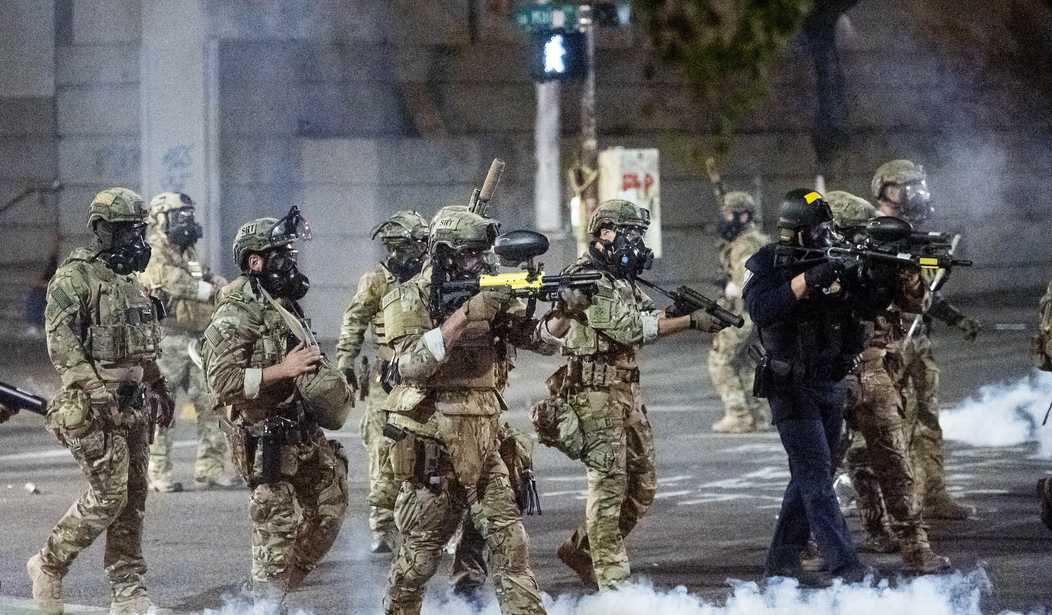A federal judge in Oregon has ruled that federal agents sent to Portland to protect government buildings and monuments do not have to identify themselves when making an arrest. The Oregon attorney general had sued the government, demanding that limits be placed on the arrest and detention of suspects.
But U.S. District Judge Michael Mosman found that state Attorney General Ellen Rosenblum “lacked standing” to bring the lawsuit in the first place and had failed to articulate any state interest beyond protecting the constitutional rights of individuals.
The suit was one of several pending legal actions against the Trump administration that allege violations of rioters’ constitutional rights. In another related legal action, a judge ruled in favor of journalists and legal observers who claim police were barring them from doing their jobs.
Mosman’s ruling came one day after another federal judge in Portland, US District Judge Michael Simon, granted an order restricting the activities of federal officers. Simon entered a temporary restraining order on Thursday that bars federal officers from arresting or using force specifically against journalists and legal observers at demonstrations unless there is probable cause that they committed a crime. Simon also ruled that clearly marked journalists and legal observers did not have to follow dispersal orders, writing that journalists are present to report on whether authorities are acting within the law.
“Without journalists and legal observers, there is only the government’s side of the story to explain why a ‘riot’ was declared and the public streets were ‘closed’ and whether law enforcement acted properly in effectuating that order,” Simon wrote.
But the ruling in support of federal law enforcement in the city recognizes the reality that the authorities in Oregon appear to be ignoring: not all of the protesters are “peaceful.” And if individual protesters feel their rights were violated, it is they who should sue, not the Oregon AG.
In his order on Friday, the judge repeatedly described the case as “unusual,” writing that typically in cases involving allegations of constitutional violations during protests, the people affected would be the ones to file a lawsuit, not a state. Rosenblum’s office was also seeking a future-looking injunction, which set an “unusually high bar” for the attorney general’s office to clear, he wrote.
To sue on behalf of citizens — a legal doctrine known as “parens patriae” — Oregon had to show that it had an interest that was separate from private individuals, and that a “quasi-sovereign interest” had been violated. Mosman wrote that the state offered mostly “purely hypothetical” arguments about the risks facing Oregonians by federal officers failing to identify themselves during arrests, such as the possibility of counterprotesters pretending to be federal officers to kidnap protesters.
Why are we not surprised that the Oregon AG gave some hysterical, paranoid scenario where fascist “counterprotesters” would “kidnap” innocent rioters?
Federal officers did not wear name badges because they want to go home to the wives and families at night and making it easy for people who are burning federal office buildings to discover the names of federal officers is an obvious danger.
For similar reasons, federal agents travel in unmarked SUVs. How many police cars have been torched in Portland in the last two months? The bottom line is that federal agents have a right to be as safe as the government can make them. Wild, paranoid talk of “plainclothes” unidentified agents dragging “peaceful” protesters off the street and throwing them into unmarked vehicles where they’re never seen again is the stuff of left-wing nightmares, not the reality of what transpired.
But Portland leftists don’t do reality. Lying, exaggerating, and ignoring the facts — anything that advances the narrative — is far better.










Join the conversation as a VIP Member